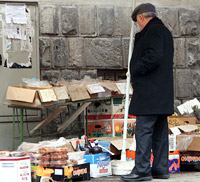What does a person say when he/she sees that the price of cheese or butter has grown by 20% within one day? They use slang to express their thoughts.
Later they target these words at importers, producers and finish it with the government. Hardly anyone would think about addressing these words to the Central Bank. However, the main institution to be blamed for these changes is the Central Bank according to the law of Armenia.
According to the RA law on central bank, the CB is the main institution responsible for prices in the country.
Article 4: The main objective of the Central Bank:
The main objective of the Central Bank of the Republic of Armenia is providing stability of prices in the Republic of Armenia. For the purpose of its main objective the main function of the Central Bank is implementing policies targeted at the stability of prices. For the purpose of its main objective the Central bank shall develop and adopt a monetary policy for implementation.” Most of people don’t know about this provision of the law. When people are asked about the functions of the CB they say that the CB is controlling the trade banks and exchange points.
Of course besides the stability of prices the CB has other goals as well, but the law says that if the other objectives contradict with this main objective of the CB, the CB shall give the preference to its main objective and this should prevail over the other secondary objectives. In other words, the CB is guiltier in the price increase but citizens do not address their critics to the CB. However the CB does not care about it and they have decided to “justify themselves” from the very beginning starting from now.
Yesterday the head of the CB’s monetary policy department Artur Stepanyan came up with an announcement saying that the stability of prices is the main objective of the Central Bank but it does not mean that the CB can solve this problem alone. He says that the growth of prices is also stipulated by the government’s policy to resist the budget deficit, as well as the efficiency of the agriculture ministry’s policy. Specifically, the ministry of agriculture should help to increase the harvest, as a result of which the prices of agricultural products will go down.
In fact the CB announces that it cannot do much with its tools to resist the prices from growing. In fact they are confessing that they cannot do their job. The CB can influence on the monetary policy only with the policy of “cheap money” or expensive “money”. However, as the Armenian banking system is not integrated with the economy much, this tool is not strong enough.
Why did they focus on the ministry of agriculture? Because the agricultural sector had the highest growth of prices last year. It was done as a result of the low level of demand, i.e. the capacity of the agricultural products available was small, thus the prices were high. The minister of agriculture says the reason was not the ministry’s policy but the weather conditions.
What is the role of the government in this process? The tax and budget collection policy influences on the price formation too. The CB has decided not to bother the government with this issue. To resist the deficit of the budget means to reduce the gap between the budget money inflow and expenses. In other words, it means to increase the capacity of money inflow in the budget. This means that the taxes should be increased too (not by increasing the tax rates but by implementing a stronger tax collection policy). As for businesses, they have only one way to respond to the growth of taxes, which is increasing the prices of their products.
The CB representative did not mention about the state competition protection committee. Some of the drastic changes of products in the recent times were directly connected with competition issues. It means that in fact the committee has more influence on the growth of prices than the CB.
In a word, the above mentioned means that the factors that influence on the price formation in Armenia are the environment and weather conditions, the government represented by the tax and customs services, the competition committee, separate large importers and then the Central Bank. It means that the consumers are targeting their critics at the right targets without understanding it.
Unfortunately people will have reasons to criticize this year too. The CB forecasts that in the end of the year the inflation rate will be 5,5-7,5%. As the monetary policy project for the first quarter writes, the possibility that the inflation rate will be that much is 40,9%. The possibility that the prices will grow approximately by 4-5,5% is 31%. The CB does not think that the inflation may grow to 7.5-9.5%. We cannot be optimistic because according to A.Stepanyan the CB has not included the changes of gas prices in its forecast. The head of the monetary policy department says that there is no official announcement about the growth of gas prices, thus they cannot include it in their analysis. There is no official announcement but the head of the GazProm company Alexey Miller gave an interview to Schpigel journal in the end of 2010, in which he said that they would supply gas to Armenia with the rates established in the market. This means that the price of gas will be increased. Unfortunately the experience shows that such rumors come true soon or later.

